Not football!
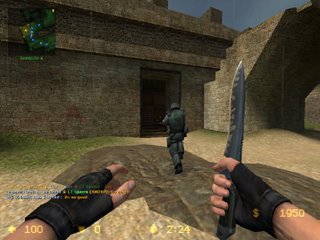
(
guarding the bridge on de_aztec)
I have a profound fascination with CounterStrike, a modification of Half Life. In my opinion, it is one of the most brilliant game designs ever made (second only to Tribes for FPS multiplay), and the fact that it was
conceived of by two people, Minh Le, a Canadian (yeah!) and Gooseman, makes it even more interesting (design by committee is for the communists).
CS is of course is now a retail product in it's own rights, and both CS 1.6 and CS Source are played avidly by the community. CS is the WoW of FPS games, and to this day,
7 years after the release, it completely dwarfs the competition in number of players (according to GameSpy stats, for whatever they're worth, CS is played by more people than ALL of the rest of the FPS games, COMBINED).
Valve just released a an
update to CS that I think is phenomenal. The radar system in CS has now been upgraded to include a background of the map that shows far more of the action than was ever previously available (even in spectator mode). The information architecture in displaying complex information in a simplified manner in this instance is worthy of praise from
Edward Tufte himself.
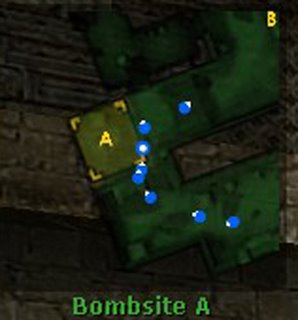
(
zoomed in radar view from above screen)
The map shows a great deal of detail, yet it is easy to understand even for the novice. Each player is shown as a blue or red dot (counterrorists or terrorists, respectively), along with an arrow showing their current orientation. Bomb areas are highlighted with a rectangular orange area showing exactly where the bomb can be planted and with text showing the name (in case you didn't know where A and B were) for each area. Teammates who use the radio buttons to broadcast information ("bomb down", "enemy spotted", etc.) flash briefly to show you where they are.
In spectator mode, the small map shows even more detail (all the better for spectators). Dead bodies, dropped bombs, player tracts, bomb plants, differences in heights, etc.
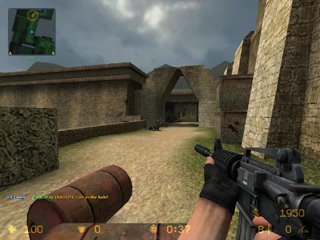
(
bomb down)
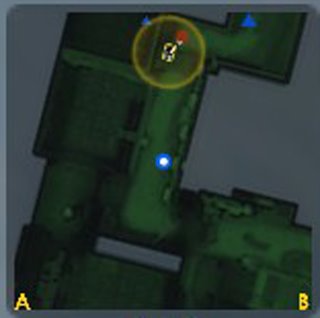
In spec mode the currently selected player is highlighted with an 'eye' (shades of
Illuminati!)
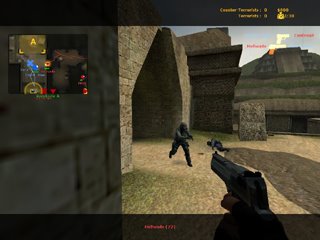
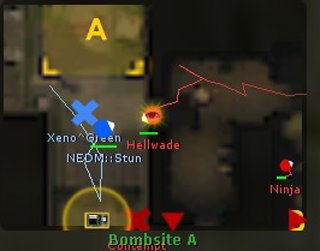
(
nothing stands between this T and the dropped bomb)

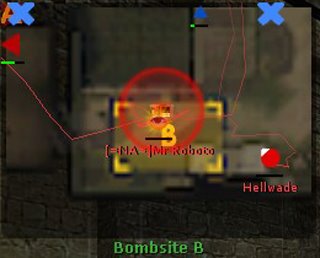
(
bomb plants are shown are flashing expanding red circles)

(
You killed Bill Cosby! You Bastards!)
The really interesting thing is how this applies to eSports. One of the biggest difficulties in making games like CS more popular is the complexity of the games themselves. Unlike normal sports where the playing field is typically rectangular and all of the players are visible, computer games have far larger and more complex game environments and arenas. The top down view provides enough information so that anyone not familiar with the game should be able to pick up the game rules and complexities fairly easy.

(
large map fully zoomed out view in spec mode)
CS is of course one of the most popular eSports games, with many tournaments played every year with thousands of dollars in prizes. The prizes are paid for by sponsors, who would dearly love for a larger audience for their products. Part of obtaining a larger audience is having very clear explanations of what is going on in any sport or game. The radar and map updates to CS is going to significantly enhance that (in fact, I think some of the major sports out there would kill for this type of overview). Graphical enhancement of information is becoming ever more common in sports these days, with NFL football plays being shown in video games.
What I would be interested in is going through some of the demos from the major tournaments over the last year, and statistically analyzing the data, and then showing that information on the map overlays to show major routes for CT and T runs, kill sites, major sites for contact, chokepoints, etc. (which brings up another point about eSports - the lack of stats tracking as compared to something like baseball or football).
Hopefully this leads to greater coverage of games like CS on TV and it also provides a lot of opportunity for coverage by outlets like
TSN.



















